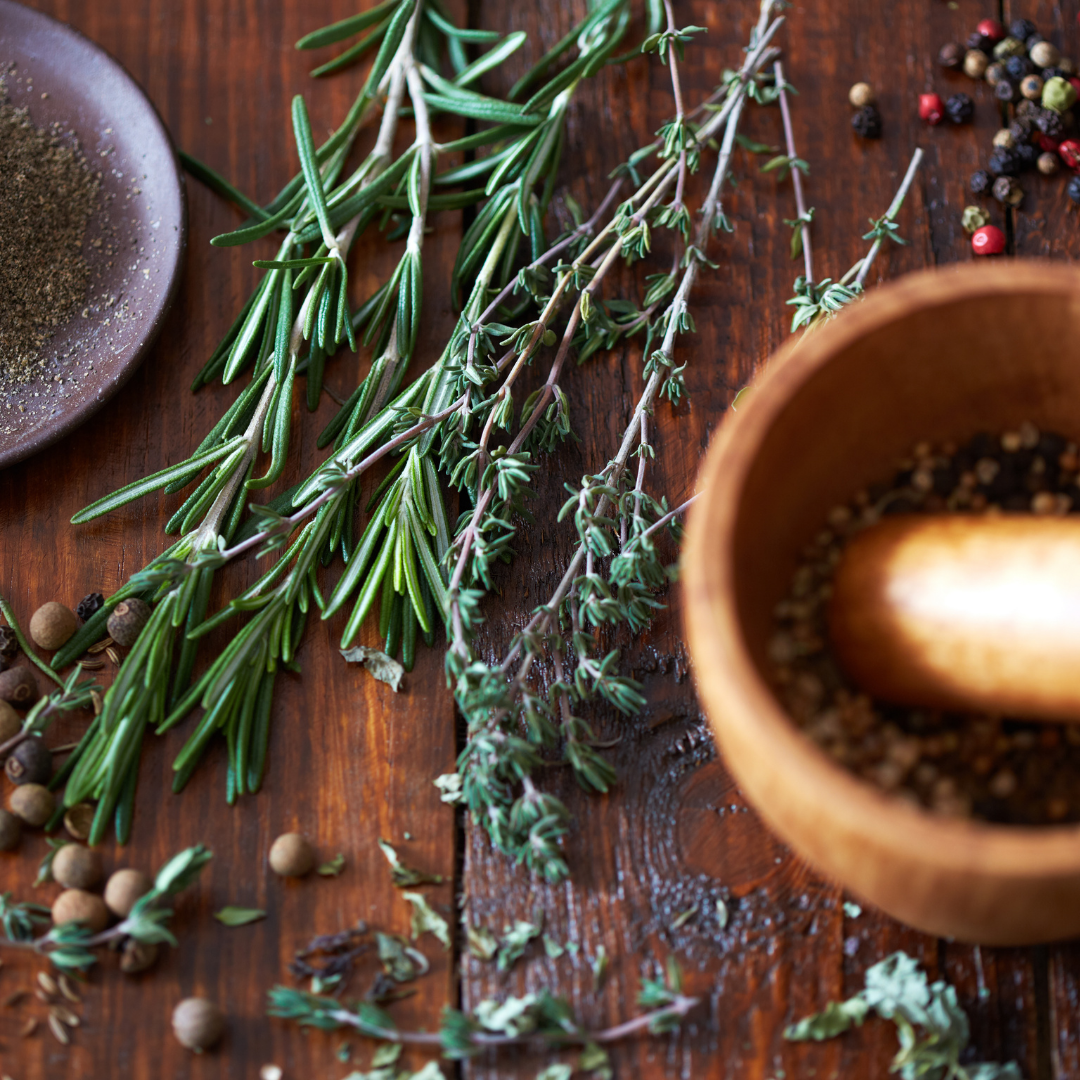What are the Health Benefits that Herbs & Spices Have Hidden In Them?
People from all across the globe use different parts of plants like roots, stems, or leaves to add flavor to their delicacies. The same is evident to all. However, did you know that these little gems of plants not only add flavor to the cuisine but also have a world of health benefits?
It is a fact that most herbs and spices add a health quotient to your meal. For centuries, people have been consuming these plant parts in several ways, including medicinal and culinary.
The medicinal aspect of herbs and spices has prepared many health improvement products, including cosmetics, disinfectants, teas, and much more. Are you curious to know how each herb helps your health in particular? If yes, then proceed with the blog to learn more!
- Turmeric – The Orange-Yellow Spice
Turmeric is the most used spice in every Indian household. It adds color and health benefits to curries. Turmeric is primarily introduced into your diet to reduce inflammation. Curcumin is the element of turmeric that adds healthy properties to it.
Curcumin matches the benefits of certain anti-inflammatory drugs. It adds more benefit to your health when involved in your diet as a substitute for drugs. You would never know how deeply your body is affected by the side effects of drugs. In addition, the antioxidant property of curcumin improves brain function, fights Alzheimer’s, and relieves arthritis.
- Hot Peppers – Chili With Pain Management Elements
For people who have pain in their joints, adding hot peppers to their everyday diet is necessary. Its critical compound – Capsaicin, makes your mouth burn just like any other spicy food item. Thus, it increases the anti-inflammatory and antioxidant properties in your body.
Hot peppers are rich in Vitamin B6, Vitamin C, and other minerals such as fiber, potassium, and beta carotene. These minerals are processed in our body to create Vitamin A. You must know, the red and orange pigment in the peppers reduces the risk of cancer!
- Ginger – A Healthy Root
Ginger has a lot of benefits other than just adding flavor to the dishes. It is one of the most recommended spices to ease nausea and vomiting. Ginger root is rich in anti-inflammatory properties that ease out the pain in one’s body.
Gingerol (an essential element of ginger) effectively treats oxidative stress. People with osteoarthritis must increase ginger intake to reduce the same symptoms.
- Thyme – A Fresh Herb
You might notice fresh thyme sprinkled over the food, but do you know about its health benefits?
Thyme is an excellent source of Vitamin A and Vitamin C. It has antibacterial, insecticidal, and antifungal properties, which helps reduce low-density lipoprotein, i.e., bad cholesterol.
Did you know it even has an effective anti-inflammatory drug – dexamethasone? Dexamethasone interferes with the pain in a patient’s body and eventually helps reduce it.
- Basil – A Holy Herb
Basil is considered a sacred plant in Indian culture. It is one of the most effective and efficient herbs out of the entire herbs and spices set with tremendous health benefits. Did you know that this sacred plant has a richness of healthy minerals?
It helps your body in many ways, like fighting infections, boosting the immune system, reducing blood sugar levels, and relaxing depression-based anxiety. In addition to that, it also soothes your mind and induces healthy sleep.
Research says the phytochemicals in the basil protect the body against different types of cancers, including lung, liver, oral, and skin cancer.
- Cocoa – The Key Ingredient For Chocolate
Who doesn’t like chocolate? Did you know that its key ingredient is rich in nutritional elements?
Cocoa seed is the key ingredient of chocolate with plenty of health benefits. The bean is full of flavonoids that work as antioxidants. The antioxidant property of coffee helps boost the consumer’s heart health.
Studies show that they play a significant role in lowering cholesterol and maintaining blood pressure. But there is a catch! It is most effective when taken in a controlled amount. Excessive intake of coffee might not prove helpful to your health.
- Fenugreek – Aromatic Seeds
Fenugreek is a chief ingredient of Ayurvedic medicines. Did you know that it can enhance libido and masculinity? Fenugreek has a significant impact on maintaining blood sugar levels. Fenugreek has 4-hydroxy isoleucine (a plant protein), which improves the body’s functioning of the hormone insulin.
Studies say that it is practically the most beneficial in treating diabetes. Intake of fenugreek along with other herbs in the form of tea can increase breast milk production. According to research, it is excellent for soothing the gut and relieving indigestion problems.
- Peppermint – The Best Ingredient For Aromatherapy
Peppermint oil has a very long history of use in aromatherapy. Peppermint oil has pain management benefits on irritable bowel syndrome. It helps in fighting nausea. It is even effective in reducing nausea post-C-section and surgery.
Few studies have shown it helps in soothing stomach pain in kids. Menthol – the prime element of peppermint oil, reduces migraine headaches. The antibacterial properties of peppermint help eliminate the smelly bacteria from the mouth.
- Garlic – Member Of Onion Family
Surprising right? Garlic does a little more than add flavor to your food. It is pretty beneficial for combatting issues like the common cold. According to studies, it is quite effective in maintaining heart health. People suffering from high cholesterol must increase the intake of garlic in their diet.
Garlic is rich in nutritious value and has a very low-calorie content—antioxidant properties of garlic help prevent Alzheimer’s and Dementia. According to research, garlic makes a person live a long and healthy life.
- Cayenne Pepper – Spices Up Your Dish
It is a type of chili used to add spice to the food. But surprisingly, it has many health benefits as well. The active ingredient capsaicin reduces appetite and speeds up the fat-burning process.
However, it is beneficial for people who do not eat peppers regularly.
Cayenne Pepper improves many health problems lingering in one’s body, including vision, bone health, immune system functioning, reproduction, and growth and development.
- Rosemary – A Key Ayurvedic Ingredient
Rosemary is an excellent herb that is present mainly in tea. It not only works to add flavor or aroma to your meal, but it also induces loads of health benefits to your body. Rosemary is rich in antioxidant, anti-inflammatory, and antimicrobial properties.
Antimicrobial compounds help build the immune system to fight the infection in the body actively. The intake of rosemary tea helps the body to maintain its blood sugar levels effectively. For people who have the most indefinite mood, rosemary is the key. It stabilizes the mood and also improves memory.
The Bottom Line:
Now you know that besides boosting the flavors and textures of the meals, herbs effectively add potential health benefits to your meal!
This blog has covered some of the most used and effective herbs and spices for you. If you too want to use the health benefits of the same, you must start including them in your diet regularly.
Using herbs and spices can be your first step towards a fit and healthy life.



